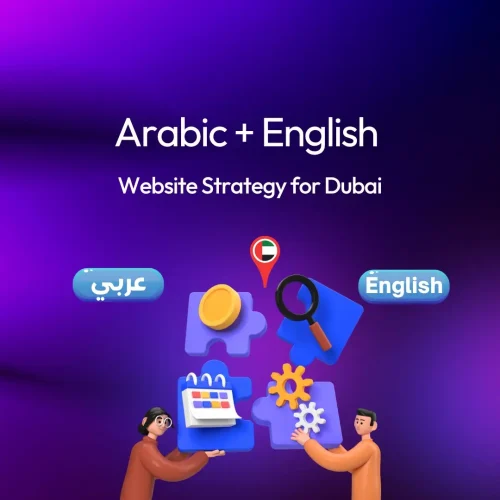Arabic + English Website Strategy for Dubai

Dubai is a melting pot of cultures and languages, where both Arabic and English are spoken across business, education, and daily life. If your website only speaks one language, you could be missing out on a massive portion of your potential audience.
In this blog, we’ll break down why a multilingual website strategy is essential for Dubai-based businesses and how you can implement a bilingual (Arabic + English) website that boosts your reach, trust, and conversions.
Why Multilingual Websites Matter in Dubai
Dubai is home to over 200 nationalities, with Arabic as the official language and English as the business language. To succeed online, brands must cater to both.
Key Benefits of a Multilingual Website in Dubai:
Reach a wider audience: Connect with both local Emiratis and the global expat community.
Improve SEO in Arabic & English: Rank in both languages on Google UAE and regional search engines.
Build trust and credibility: Visitors are more likely to convert when content is in their preferred language.
Meet cultural expectations: Arabic-speaking users often expect RTL (right-to-left) design and language accuracy.
Bilingual Strategy Blueprint: Arabic + English for Dubai Businesses
1. Localize, Don’t Just Translate
Avoid direct, word-for-word translation. Instead, adapt your content to reflect the cultural tone, values, and context of each language group. This creates more natural and persuasive communication.
2. Structure Your Site with SEO in Mind
Use subdirectories (e.g., /en/ and /ar/) or subdomains (e.g., en.yoursite.ae, ar.yoursite.ae) for each language. This ensures clean site architecture and helps search engines properly index each version.
3. Choose an SEO-Optimized Multilingual CMS
WordPress with WPML, Webflow, or Shopify with multilingual support are great choices. These platforms offer built-in features for easy language switching and translation management.
4. Arabic UX: It’s More Than Just Language
Arabic is a right-to-left language, which affects layout, buttons, and overall design flow. A properly designed Arabic website improves user experience and engagement.
5. Use hreflang Tags for Google
These tags signal to search engines which language version to show users based on their browser or location. It prevents duplicate content issues and improves international SEO.
Case Snapshot: Multilingual Success in Action
One Dubai-based law firm saw a 92% increase in organic Arabic traffic after launching a bilingual site. Conversion rates rose on both versions, especially among mobile users who preferred browsing in their native language.
Tip: Always test page performance across devices in both languages. Mobile UX is critical in Dubai’s digital market.
If you want your business to thrive online in Dubai, offering content in both Arabic and English isn’t just a bonus—it’s a competitive advantage. A multilingual website strategy aligned with local culture, user behavior, and SEO best practices can unlock massive growth and engagement.
Frequently Asked Questions (FAQ)
1. Why is a multilingual website important for businesses in Dubai?
Dubai is a diverse, multicultural hub. A multilingual website—especially in Arabic and English—helps businesses reach wider audiences, improve local SEO, and gain trust with both Emiratis and expats.
2. What’s the difference between translation and localization?
Translation changes words from one language to another. Localization adapts the message culturally—considering tone, imagery, and layout—to better connect with the audience. For Dubai, this is critical for Arabic-speaking users.
3. Should I use a subdomain or subfolder for each language version?
Both are valid, but subfolders (e.g., /ar/, /en/) are usually better for SEO and easier to manage. Google can crawl them more efficiently, which helps rankings for both versions.
4. Is Arabic right-to-left layout necessary for websites in Dubai?
Yes. Arabic requires RTL (right-to-left) layout to be user-friendly and readable. Skipping this can result in poor user experience, lower engagement, and high bounce rates from Arabic-speaking visitors.
5. Can I use Google Translate for my multilingual site?
Not recommended. Automatic translation tools often misinterpret phrases or lose meaning. For best results, hire native speakers or use professional translation/localization services tailored for the UAE market.

